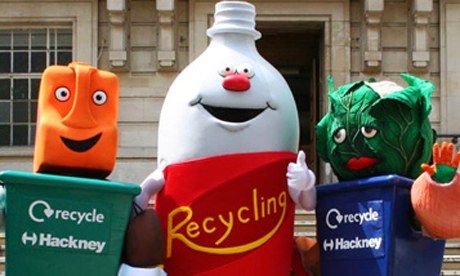Friends of the Earth slams Hackney Council’s mixed-up recycling plan

Eco-campaigners all calling for a re-think over the council's new recycling proposal. Photo: Hackney Council
Whilst Hackney Council has announced that recycling on council estates is improving, local environmental campaigners fear that a proposed new system will be worse for the environment.
Official figures show that by the end of last year, recycling levels on estates were at their greatest ever, with a massive 315 tonnes of recycling collected during December. This is the equivalent of 35 London buses and beats the previous record by 15 tonnes. Around half of all Hackney residents live on an estate.
Meanwhile, the local branch of Friends of the Earth is concerned that Hackney Council is re-considering its waste contract and looking to move to a ‘commingled’ system with another contractor.
This would be hazardous for the environment, the group claims. Although ‘commingling’ waste appears to collect more, this is because more unrecyclable waste is thrown in by the public. Given that all the waste is then mixed up and crushed in the same vessel, much is contaminated.
Jo Finburgh of Friends of the Earth said, “This means, on average, 10% is rejected – off to incinerators or landfill – and even what is sorted is often such poor quality it has to be exported – for example to the Chinese market – whilst UK reprocessing industry cry out for decent quality recyclates (which we get from kerbside sorted, as Hackney currently has). Using cheaper labour in developing countries costs UK jobs and denies valuable materials to UK manufacturing. Ultimately the council gets less money for the recyclates and has to pay for huge sorting sheds meaning less money to spend on public services.
“Councillors are for the most part unaware of the details of recycling and are more than likely just to nod through the advice of the recycling and waste officers.
“Currently May Gurney, which is contracted to do Hackney’s recycling, varies the system, and perhaps there are others involved in the collection contract too. Separating recycling early – at the kerbside rather than later at a big sorting shed – means that you preserve the quality of the materials, keep jobs in the local community, and get more money from the recyclable goods to put back in to local services.”
The group is calling on local residents to contact their local councillors to press for the current system to be retained.
Update: 7.15pm Friday 18 February 2011:
A Hackney Council spokesperson said: “The Council’s current recycling contract with May Gurney, delivering a kerbside sort service for street based properties and a commingled service to estates, runs until February 2013. There will be no change to the main elements of our recycling service in that period. However, we are reviewing the performance of the current service to determine how best to achieve greater levels of recycling through practical and cost effective systems.”
The council says there are issues faced by the green box service: whilst the green box provided to street level properties contributed 44.35% of Hackney’s recycling total in 2009/10, 10,600 low rise properties are not suitable for the current green box service due to insufficient storage space.
62% of properties covered by the green box service are in multiple occupancy dwellings.
The council claims that commingled collections may be appropriate in circumstances where the other options are impractical, e.g. dense urban areas where on-street parking and heavy traffic require fast loading without the need to return containers to the point of collection, or for high density flats, transient areas and multi-occupied properties. All of these factors are evident within Hackney and shared with other inner London boroughs.
The Town Hall also claims a commingled approach would address a number of issues with the current service. These include:
1. Providing greater capacity to collect, store and present recyclables
2. Improving containment of recyclables
3. Reducing congestion on streets due to improved productivity
4. Improving the streetscene by removing the number of receptacles presented
The council also said that any decision to change the current service needs to balance the issues of cost, practicality, end use for recyclable materials and associated environmental impacts.
